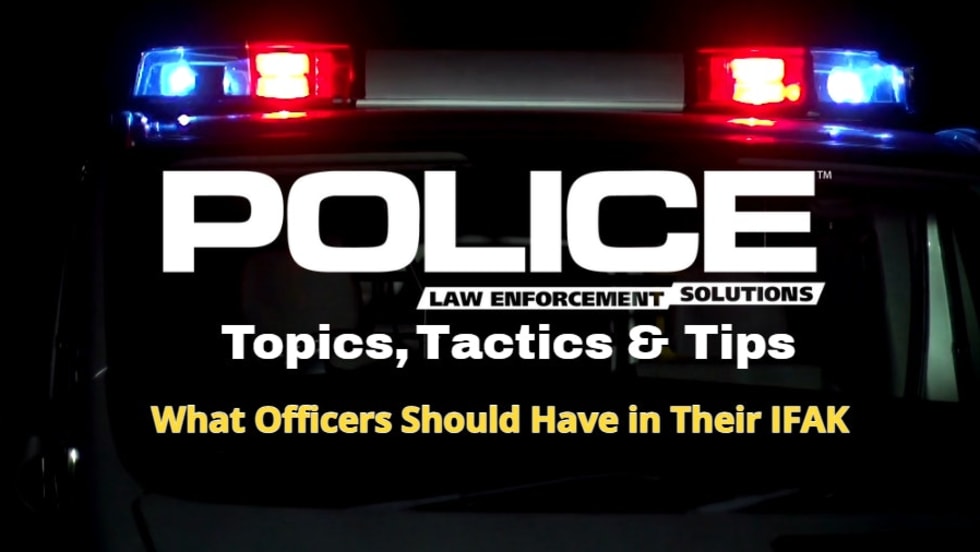There's a lot you can learn from veteran and retired officers who have worn the badge before you, including how to thrive and prosper in the law enforcement profession.
I retired a senior lieutenant in December 2015, after 29 years of service. When I first entered law enforcement in 1984, I had already served four years on active duty in the U.S. Army (after graduating high school at 17) and was continuing to serve in the Army Reserve. After leaving active duty and prior to entering the police academy, I worked two years fixing copy machines and word processors. It was my attempt at having what some would consider a normal nine-to-five job. But spending the next 30 years blowing toner out from my nose was not my idea of a fulfilling career.
I have always been the type of person driven by a desire to make a difference. Since the military and law enforcement shared some similar goals, the transition to a law enforcement career was a logical choice. As most veterans recognize, the military is far from perfect but little did I know that law enforcement was wrought with its own set of cultural and political pitfalls.
This article will focus on a set of recommendations based on lessons learned during my 29-year law enforcement career. Some of my suggestions may resonate with you and others may not. I recognize that dealing with advice usually creates four types of responses. You agree with it, disagree with it, ignore it, or wish you had listened to it. I’m trying to get you to work on the last one. My recommendations are presented in no particular order and designed as considerations more than ironclad solutions.
1. Act like a Volunteer
Unless you were court ordered to become a law enforcement officer, you volunteered. You filled out the paperwork, you attended the academy, and you sought out an agency for employment. Keep acting like a volunteer by staying hungry for the job. Accept responsibility, do your best work, and always seek improvement. Keep a sense of urgency about you and stay curious.
If you don’t, then don’t complain when you are turned down for promotions or that assignment you’ve always wanted. If all you’ve done is show up for work and do the bare bones minimum, then you have already received your reward; a paycheck.
2. Grow Thick Skin
As law enforcement officers we deal with situations most people would run away from. And yet, those same people will turn around and get ugly with us. Be aware that there are professional agitators whose sole purpose in life is videoing you losing your temper and doing something stupid. You need to have a thick skin and not allow any of that negative behavior to get to you. From experience I know this is easier said than done but you need to nail down responding and not reacting. Your career is based on obtaining control and staying in control.
To succumb to your raw emotions is to surrender yourself to the very people who are trying to bring you down. You need to take the high road and keep your composure. Accept the challenge and remain firm, focus on your duty, and don’t let yourself be played into the evening news. Think of thick skin as your emotional Kevlar.
3. Know Your Job
To be effective, you have to know your job inside and out. There is no excuse for sloppiness or careless mistakes. Graduating the academy is but the first step in an ongoing learning process that should span your entire career. Times change and so do laws; leadership positions change and so do policies. That alone is reason enough to stay current on what you can and can’t do. You should know your duties both assigned and implied and make good use of officer discretion. To do otherwise is to invite failure. Since some agencies play the blame game instead of working toward finding solutions, knowing what to do and how to do it helps keeps a witch-hunt from affecting you and your career.
4. Do Your Job
Knowing your job and doing it are not the same thing. It’s not enough for you to know what to do; you have to actually do it. I don’t know of anyone who has been disciplined for doing the job. It’s hard to be attacked if you are following policy and procedure. Of course there is a very real possibility that you will upset certain people because you make them look bad. I have had to defend myself from supervisors who were unfamiliar with policy or liked looking the other way. That was their problem, not mine.
5. Have Crazy Skills
Whatever tools you use, be very well versed in them. Be crazy good with your handgun, shotgun, and rifle. You can’t afford to be otherwise. One miss could alter not only your life, but the life of an innocent bystander. You also need to stay up on your subject management and control techniques. In today’s world, resisting arrest isn’t a fad and the notoriety of fighting with the police isn’t going away any time soon.
Having crazy skills is not limited to weapons or control techniques. The same can be said for any skill you need in order to do your job. Knowing how to manipulate your agency’s database can be just as important as anything else.
6. Guard Your Reputation
One of the biggest factors that affects your career is your reputation. Don’t do anything that will tarnish it and that includes posting stupid things on social media. Once you are labeled a bad egg, it’s almost impossible to get rid of that label. Some people never go anywhere in the agency by choice. Others have such a poor reputation it's amazing how they have stayed employed. I assure you that members of your agency may not know you personally, but they know you from your work product and the stories that follow it.
7. Avoid the Appearance of Wrongdoing
Transparency is key. If you stop at your local convenience store to use the restroom or get a soda, check out over the radio. If you are not doing anything wrong, then why appear to be hiding it? If you need to go out of your zone for a few minutes to go pick up your uniforms from the dry cleaners, ask your supervisor for permission. In other words, don’t put yourself in any situation where someone might feel the need to question what you were doing. “Why were you still parked at home when you went back in service?” is never a good way for a conversation with your supervisor to start.
8. Get Involved with Your Agency
People who get involved stand out. Look for and accept additional responsibility. Volunteer for committee work and have a say in your agency’s awards program, special events, or policy reviews. Become a field training officer or an in-service instructor, participate in your police athletic league, or work as an advisor to your police explorer program. Find ways to get involved and show your interest in keeping your agency going forward. It all counts when being considered for assignments, schools, and promotions. When the command staff talks about you, and they will, you want to be seen in a positive light.
9. Know How to Deal with a Poor Supervisor
It’s just a matter of time before you will have to deal with a poor supervisor. Your first line of defense is to make sure you are doing your job even if the supervisor isn’t. Second, you need to document your work and keep your own paper trail. Take notes on all negative interactions and keep hard copies of all directives, memos, and e-mails to help refresh any selective memory that will be used against you down the road. Third, make sure that you have witnesses to important conversations in order to avoid a situation later on. Lastly, at the end of the day when you can’t take it anymore, you only have three options; ride it out, try to work things out, or transfer out to another unit.
10. Pick and Choose Your Battles
Never fight an issue, set of instructions, or an order just for the sake of fighting. Just because you disagree with something doesn’t make it a reason to go toe to toe with your supervisor or your agency. Fighting an issue just because you can is like hitting your hand with a hammer and expecting it not to hurt. There is a huge difference between disagreeing in a respectful manner and going crazy for nothing more than pride or ego.
11. Learn How to Deal with Rejection
You have to keep in mind that some decisions are not yours to make. You will never escape office politics, an agency’s climate, or its culture. Let’s face it, just because you’re qualified doesn’t mean you get promoted. Just because your idea is a good one, doesn’t mean it will be adopted. Just because you are right, doesn’t mean things will change. If you didn’t get promoted, take the test again. If they turn down your idea, resubmit an updated version in six months. If things don’t change, keep trying. There will come a time when the circumstances will be different and change will be welcome. During these frustrating times, I always referred back to one of my favorite Japanese proverbs: “Fall seven times, stand up eight.” In other words, don’t stop trying and don’t give up.
12. Remind Yourself Why You Do This
When you are at your lowest, try to focus on the reasons why you became a law enforcement officer. Remind yourself of the times you made a difference in someone’s life. Law enforcement is defined by one moment at a time. List the things you have accomplished. Don’t let some jackass’ actions stop you from reaching your goals. If you give in, it’s tantamount to surrender. Make every effort to stay in the game. Everybody has bad days so remember you’re not the only one.












